
Micah 7 is the seventh chapter of the Book of Micah in the Hebrew Bible or the Old Testament of the Christian Bible. This book contains the prophecies attributed to the prophet Micah, and is a part of the Book of the Twelve Minor Prophets.
Isaiah 40 is the fortieth chapter of the Book of Isaiah in the Hebrew Bible or the Old Testament of the Christian Bible, and the first chapter of the section known as "Deutero-Isaiah", dating from the time of the Israelites' exile in Babylon. This book contains the prophecies attributed to the prophet Isaiah, and is one of the Books of the Prophets. Parts of this chapter are cited in all four canonical Gospels of the New Testament.
Isaiah 12 is the twelfth chapter of the Book of Isaiah in the Hebrew Bible or the Old Testament of the Christian Bible. This book contains the prophecies attributed to the prophet Isaiah, and is one of the Books of the Prophets. The Cambridge Bible for Schools and Colleges describes this chapter as "the lyrical epilogue to the first great division of the book ".
Isaiah 33 is the thirty-third chapter of the Book of Isaiah in the Hebrew Bible or the Old Testament of the Christian Bible. This book contains the prophecies attributed to the prophet Isaiah, and is one of the Books of the Prophets. The Jerusalem Bible groups chapters 28-35 together as a collection of "poems on Israel and Judah".

Micah 1 is the first chapter of the Book of Micah in the Hebrew Bible or the Old Testament of the Christian Bible. This book contains the prophecies attributed to the prophet Micah, and is a part of the Book of the Twelve Minor Prophets.

Micah 2 is the second chapter of the Book of Micah in the Hebrew Bible or the Old Testament of the Christian Bible. This book contains the prophecies attributed to the prophet Micah, and is a part of the Book of the Twelve Minor Prophets.

Micah 3 is the third chapter of the Book of Micah in the Hebrew Bible or the Old Testament of the Christian Bible. This book contains the prophecies attributed to the prophet Micah, and is a part of the Book of the Twelve Minor Prophets.

Micah 6 is the sixth chapter of the Book of Micah in the Hebrew Bible or the Old Testament of the Christian Bible. This book contains the prophecies attributed to the prophet Micah, and is a part of the Book of the Twelve Minor Prophets.

Zechariah 1 is the first chapter of the Book of Zechariah in the Hebrew Bible or the Old Testament of the Christian Bible. This book contains the prophecies attributed to the prophet Zechariah, and is a part of the Book of the Twelve Minor Prophets. As the first of the 14 chapters in the book, this chapter is a part of a section consisting of Zechariah 1-8. It records an introduction and the first two of eight visions received by the prophet.
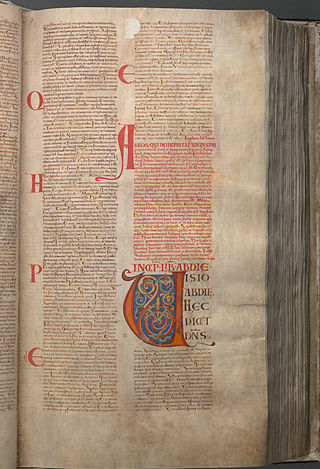
Amos 6 is the sixth chapter of the Book of Amos in the Hebrew Bible or the Old Testament of the Christian Bible. In the Hebrew Bible it is a part of the Book of the Twelve Minor Prophets. This book contains the prophecies attributed to the prophet Amos. The Jamieson-Fausset-Brown Bible Commentary summarises this chapter as
[a] denunciation of both the sister nations for wanton security — Zion, as well as Samaria: threat of the exile: ruin of their palaces and slaughter of the people: their perverse injustice.

Amos 7 is the seventh chapter of the Book of Amos in the Hebrew Bible or the Old Testament of the Christian Bible. In the Hebrew Bible it is a part of the Book of the Twelve Minor Prophets. This book contains the prophecies attributed to the prophet Amos; in particular, the seventh, eighth, and ninth chapters contain visions and their explanations. This chapter contains three visions: the locusts, the fire, and the plumb-line. The visions are then "interrupted" by a narrative about Amos and his listeners in Bethel, before they continue in chapter 8.

Amos 8 is the eighth chapter of the Book of Amos in the Hebrew Bible or the Old Testament of the Christian Bible. In the Hebrew Bible it is a part of the Book of the Twelve Minor Prophets. This book contains the prophecies attributed to the prophet Amos; in particular, the seventh, eighth, and ninth chapters contain visions and their explanations. This chapter opens with a vision of a basket of summer fruit.
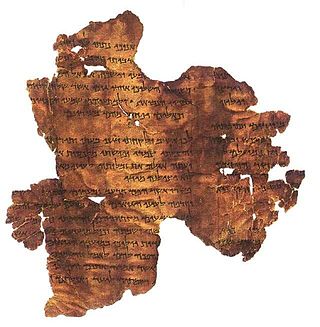
Hosea 3 is the short, third, chapter of the Book of Hosea in the Hebrew Bible or the Old Testament of the Christian Bible. This book, part of the Book of the Twelve Minor Prophets, contains the prophecies attributed to the prophet Hosea, son of Beeri, and this chapter refers autobiographically to Hosea's marriage to a woman who is an adulterer. His purchase of her from a paramour is treated in the Jamieson-Fausset-Brown Bible Commentary as a symbol of "Israel's condition in their present dispersion, subsequent to their return from Babylon".

Hosea 6 is the sixth chapter of the Book of Hosea in the Hebrew Bible or the Old Testament of the Christian Bible. In the Hebrew Bible it is a part of the Book of the Twelve Minor Prophets. This chapter contains prophecies attributed to the prophet Hosea, son of Beeri, including an exhortation to repentance and a complaint against Israel and Judah for persisting still in their wickedness.

Hosea 12 is the twelfth chapter of the Book of Hosea in the Hebrew Bible or the Old Testament of the Christian Bible. In the Hebrew Bible it is a part of the Book of the Twelve Minor Prophets. This chapter contains prophecies attributed to the prophet Hosea, son of Beeri, delivered about the time when the Kingdom of Israel (Ephraim) sought the aid of the Egyptian king So, in violation of her covenant with Assyria. References to contemporary events sit alongside allusions to the patriarchal age in Israel's history. Hosea exhorts the country's leaders to follow their father Jacob's persevering prayerfulness, "which brought God's favor upon him". The Jamieson-Fausset-Brown Bible Commentary notes that "as God is unchangeable, He will show the same favor to Jacob's posterity as He did to Jacob, if, like him, they seek God".

Hosea 14 is the fourteenth and final chapter of the Book of Hosea in the Hebrew Bible or the Old Testament of the Christian Bible. In the Hebrew Bible it is part of the Book of the Twelve Minor Prophets. This chapter concludes the prophecies attributed to the prophet Hosea, son of Beeri, with an exhortation to repentance, a promise of God's blessing, and a concluding verse resembling the wisdom tradition.
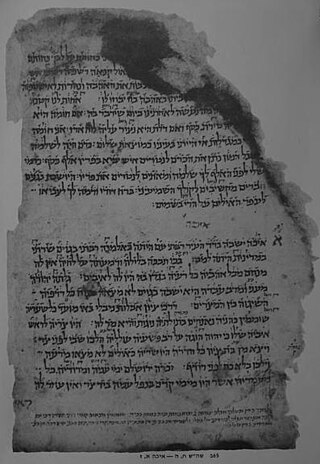
Lamentations 1 is the first chapter of the Book of Lamentations in the Hebrew Bible or the Old Testament of the Christian Bible, part of the Ketuvim ("Writings").
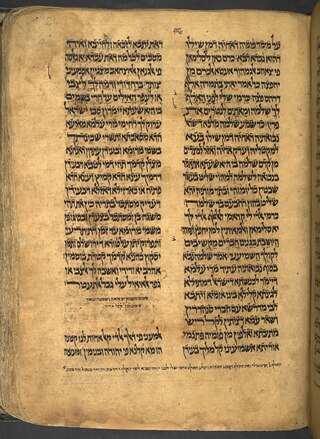
Lamentations 2 is the second chapter of the Book of Lamentations in the Hebrew Bible or the Old Testament of the Christian Bible, part of the Ketuvim ("Writings").
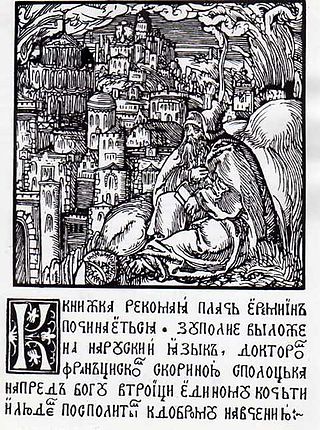
Lamentations 4 is the fourth chapter of the Book of Lamentations in the Hebrew Bible or the Old Testament of the Christian Bible, part of the Ketuvim ("Writings").
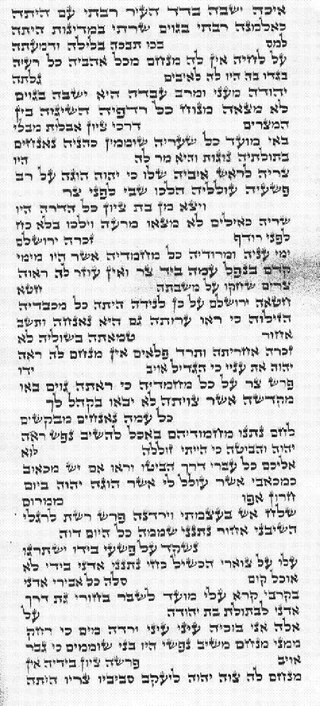
Lamentations 5 is the fifth chapter of the Book of Lamentations in the Hebrew Bible or the Old Testament of the Christian Bible, part of the Ketuvim ("Writings").












